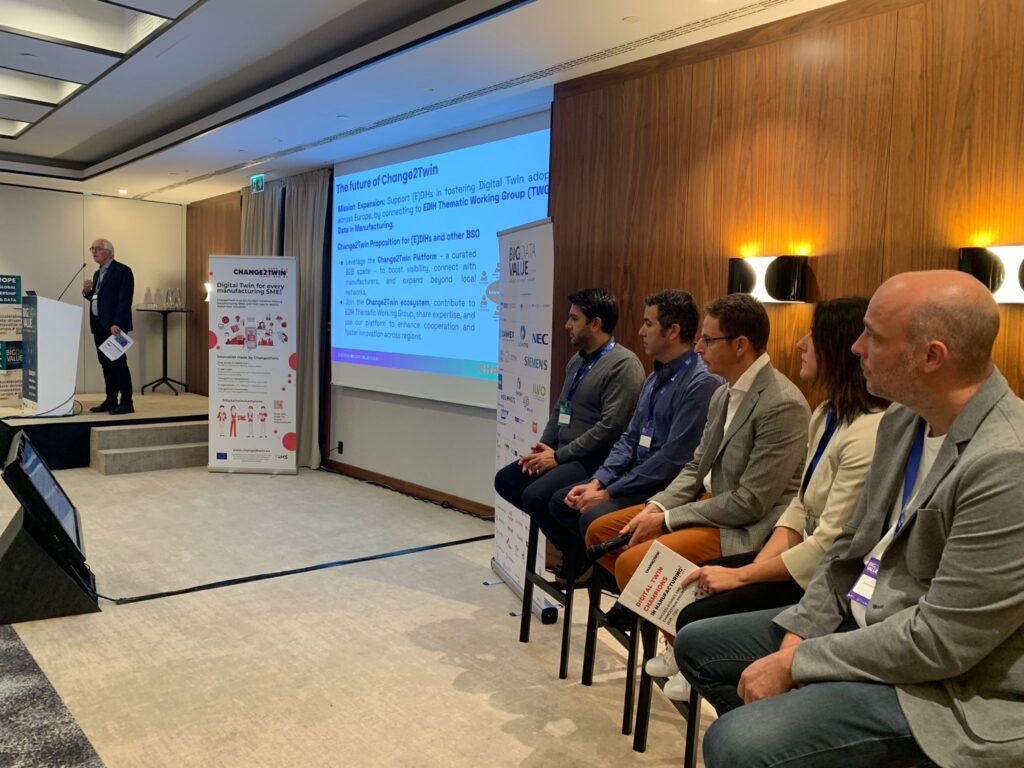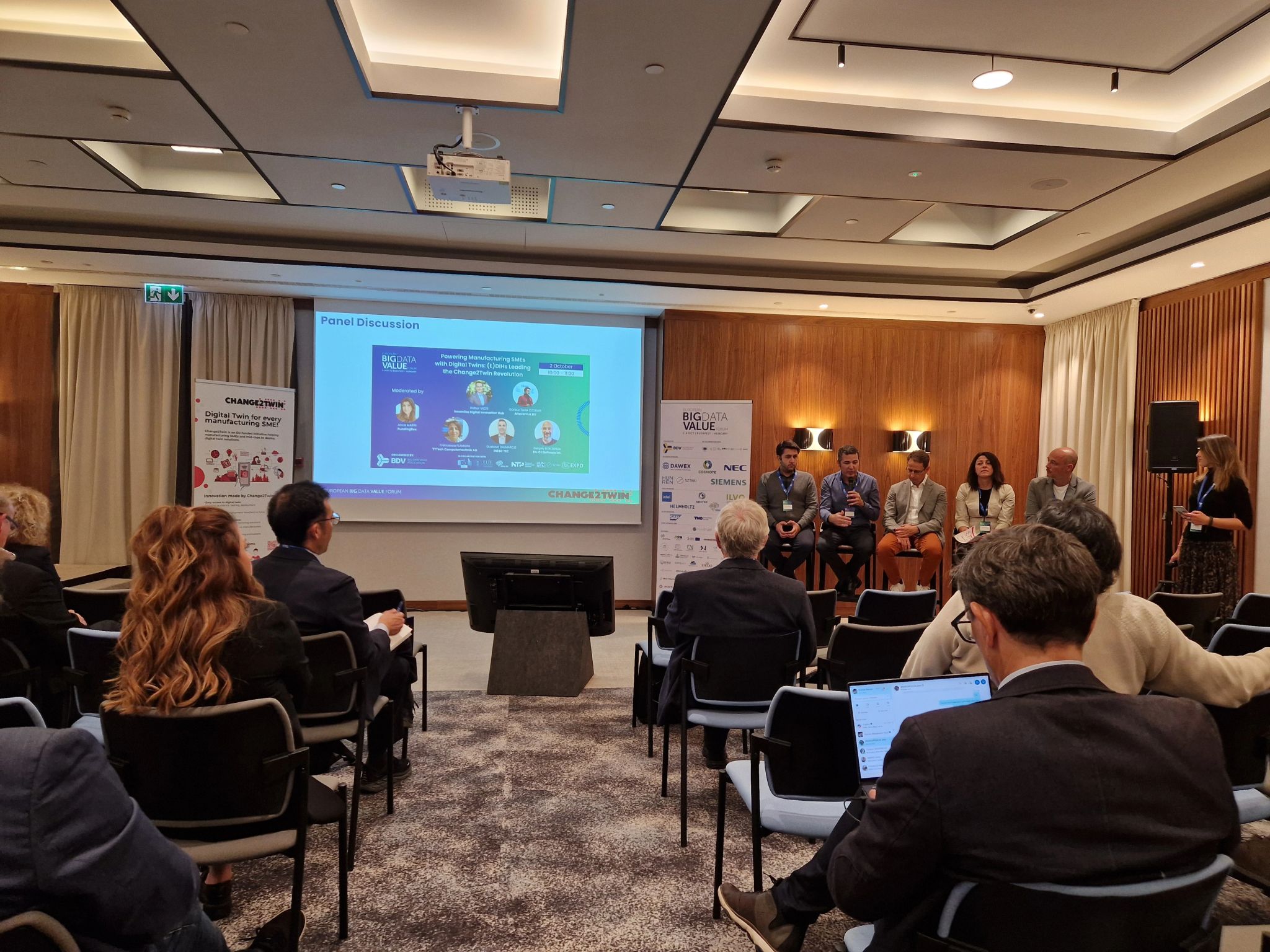The European Big Data Value Forum (EBDVF) 2024 in Budapest, Hungary, held from October 2-4, brought together a diverse range of stakeholders from the data and AI landscape. Organized by the Big Data Value Association (BDVA), the event attracted industry professionals, policymakers, and researchers to discuss and shape the future of data-driven AI in Europe. Among the sessions throughout the 3-day event, the Change2Twin project’s panel, “Powering Manufacturing SMEs with Digital Twins: (E)DIHs Leading the Change2Twin Revolution” aimed at bringing its contribution to the topic.

Digital Twin technologies: a game changer for manufacturing SMEs
The session kicked off with Change2Twin coordinator Tor Dokken from SINTEF, who provided an overview of the project’s achievements. He highlighted how the tools and methodologies developed within the project, such as the Compass assessment tool and the Digital Agora platform, have been pivotal in supporting SMEs across Europe to integrate Digital Twin technologies into their operations. Tor emphasized the importance of ongoing collaboration with EDIHs to ensure these innovations continue to foster growth and efficiency in the manufacturing sector.
Following Tor’s introduction, the session delved into the panel discussion, bringing in perspectives from both technology providers and SMEs that have successfully adopted these solutions. Francesca from TTTech discussed how Change2Twin’s tools have been instrumental in guiding companies through their digital transformation journey, while also pointing out the non-technological benefits, such as improved decision-making and enhanced competitiveness that SMEs have experienced.
Overcoming barriers to digital transformation
Gustavo Dalmarco from INESC TEC highlighted the challenges that SMEs often face when adopting new technologies. He stressed the importance of creating a supportive ecosystem that not only provides the technical tools but also fosters collaboration between technology providers, SMEs, and EDIHs. Gustavo shared valuable insights into the common barriers SMEs encounter and how these obstacles are tackled by the activities carried out by their EDIH.
Representing one of the success stories from the SME beneficiaries, Boromisza Gergely from EN-CO Software Zrt. shared the use case of MIRELITE MIRSA Zrt., a Hungarian SME that benefited from Change2Twin’s solutions. He discussed how the implementation of Digital Twin technology transformed their production processes, making them more efficient and scalable. He also touched upon the collaborative nature of the project, explaining how both the manufacturing company and the tech providers benefited from a stronger, more coordinated approach.
Gürbüz Taha Özdemir from Altaventus BV echoed similar sentiments, providing a perspective from Turkey’s TEKKAN Plastik ve Ticaret A.Ş. He elaborated on the challenges of aligning internal teams, particularly in balancing the short-term needs of production with the long-term vision required for successful R&D. Despite these challenges, the Digital Twin technology had a profound impact on the company, transforming how their teams work together.
The role of EDIHs in upskilling and supporting SMEs
The session also emphasized the critical role of EDIHs in not only providing technological tools but also addressing the skills gap within SMEs. Gabor Vicze from INNOMINE DIH highlighted the efforts of local EDIHs in upskilling workers to ensure they are equipped to handle new digital solutions. He also pointed out that while technology is essential, the real driver of transformation lies in the people who use it. EDIHs have been crucial in bridging the gap between available technology and workforce readiness.

Key takeaways and looking ahead
As the panel concluded, moderator Anca Marin summed up the key insights from the discussion. She underscored the importance of not only developing tools like the Change2Twin marketplace but also ensuring these tools are actively supporting real-world businesses. The future of European manufacturing depends on fostering an ecosystem where EDIHs, SMEs, and technology providers collaborate consistently to drive meaningful innovation.
The session closed with a call to action for all participants to stay engaged with the Change2Twin project and to continue leveraging the resources available to them. The project, as showcased in this panel, has demonstrated that Digital Twin technologies are not just about improving processes—they are about driving a digital revolution in the manufacturing sector across Europe.
By bringing together diverse stakeholders from across Europe, the event has once again proven to be a key platform for advancing discussions on the future of data, AI, and digital transformation. The Change2Twin session highlighted how collaboration, innovation, and strategic use of digital tools are shaping the future of manufacturing SMEs across the continent.
Anca Marin